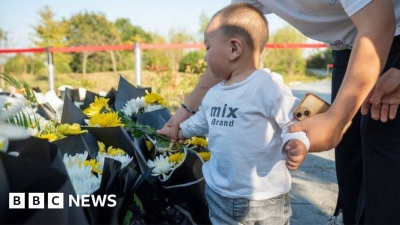BBC News Top Stories-World Li Keqiang Chinese leaders hometown mourns his death
November 2, 2023 5 min 935 words
这篇报道展现了中国人对前总理李克强的哀悼和赞扬,但也反映了中国政府对于公众表达对其的感情的紧张情绪。李克强因其朴实的出生背景和关心普通百姓而备受尊敬,他的去世引发了广泛的悼念和反思。然而,中国政府仍试图限制对他的正面评价,以免与现任领导人习近平产生对比。 中国政府对媒体和民众的控制使得公开批评习近平或共产党成为危险之举,但李克强的去世为人们提供了一个机会,能够表达他对国家的愿景以及相对开放和温和的政治方式。这与习近平的强硬路线形成鲜明对比。 报道中提到,一些民众在表达对李克强的感慨时遭到官员的打断和驱赶,这反映出政府对舆论控制的严格。这种紧张气氛凸显了中国内外政治环境的紧张和媒体自由的限制。 李克强的去世引发了中国社会的复杂情感,揭示了政府对民众情感的担忧。这篇报道强调了中国政治体制中的敏感性和民众对李克强的感情深厚,同时也表明中国政府对于舆论的严格控制。
"He was a great leader who has remained in our hearts," says a man who has come to pay his respects to Li Keqiang, China's popular former premier who died last week.
Flowers in hand, he and his son walk up to Li's childhood home on Hongxing road in the city of Hefei. The footpaths are covered in a sea of flowers. Crowds of mourners have been gathering since the 68-year-old suddenly died in Shanghai of a heart attack.
"He visited our textile factory and it left a deep impression," says the man. Li was from the same province as him, Anhui, he added: "It's too sad. I can't accept it."
China's Communist Party has had no choice but to allow this remembrance of Li, who had been the number two leader before he retired earlier this year. But even in death, he remains a challenge to China's current leader, Xi Jinping.
Publicly criticising Xi, or the Communist Party, would be dangerous. But Li's passing has provided a window to acknowledge his vision for the country and his seemingly more open and moderate approach to politics - which many see as a sharp contrast to Xi's hard-line style.
"My best friend and I took a day off to come here and place flowers," says a well-dressed middle-aged woman, wearing a pearl necklace and earrings. "He was always looking out for ordinary people. He always had us in his heart."
However, she is soon interrupted by officials telling her, and the BBC crew, to move on.
Officers in plain clothes keep gathering in greater numbers around those speaking to the BBC, listening in to what they say. Along Hongxing road, there are hundreds of them, and many more Communist Party volunteers. They are there to maintain order, and journalists are pushed out of the area, with interviews prevented.
Two young women in their 20s can barely be heard over the shouts telling them to leave, as they try to explain the gratitude and love they wanted to express towards Li.
Two other women emerge from Hongxing road, and one of them is pushing their mother in a wheelchair. "We took our mother to visit our former premier," one of them says.
"I saw him and paid my respects," her elderly mother chimes in, clasping her hands as if to pray. "He was a really good man…" she continues, but then a woman appears next to her and starts pushing the wheelchair away, urging them to leave and stop talking to the media.
Nearby, a man wearing a backpack is watching. He says he has come to Anhui province from Shanghai to honour Li, "a leader who ordinary people believe spoke the truth".
"When we had difficulties or hardships, he visited to try to understand the situation." Then, referring to the man who has replaced him as premier, he adds "not like Li Qiang", who he describes as a sycophant.
When asked to clarify if he thought Li Keqiang was better than Li Qiang, he says: "I don't need to say it. You can ask anyone in Shanghai."
By now, people are gathering to listen. "Chinese officials are not used to speaking the truth," he says. "When we heard about his death, we felt surprised because Chinese leaders normally have good health and live to a long age."
An official interrupts the interview, and starts pushing him down the street. She keeps telling him that he's not a local, implying that it is not his place to come to Hefei and start speaking to reporters. He turns to the BBC crew and says, "I can't stay here". The official physically manoeuvres him into a taxi and orders him to leave.
About an hour's drive out of Hefei, another house where Li used to live has become a place of remembrance. Like in Hefei, the regional capital, the home of Li's ancestors in the village of Jiuzi is surrounded by thousands of flowers, bunched together in black plastic for the occasion.
Police have cleared a pathway for mourners to enter and leave. Chickens and birds can be heard above the shuffle of feet and quiet words as people bow in front of the thatch-roofed, mud-walled house where Li spent time as a child.
His modest background has endeared him to ordinary Chinese, especially after he famously referred to the high proportion of them who still live on a meagre income. Two women who've brought their small daughters to place flowers acknowledge this - one of them describes him as "considerate" towards the country's poor and its millions of migrant labourers.
"He was always thinking of ordinary folk, so we brought our daughters here to send him off," she adds. Another woman walks past and stops to say: "He was really down to earth. He's the son of a farmer. He didn't behave like an official."
Then an 80-year-old woman arrives with her family. She is wearing a red medal around her neck with a hammer and sickle, the symbols of the Communist Party. She holds it up, declaring proudly that she's been in the Party for 60 years.
Asked if Li was one of the best leaders China has had, she says, "Yes, yes, yes". Her much younger companion adds: "He was actually the best."
Clutching her medal, the older woman says: "Premier Li won people's hearts."

